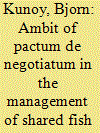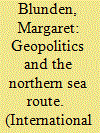|
|
|
Sort Order |
|
|
|
Items / Page
|
|
|
|
|
|
|
| Srl | Item |
| 1 |
ID:
116551


|
|
|
|
|
| Publication |
2012.
|
| Summary/Abstract |
The United Nations Convention on the Law of the Sea provides for a mechanism pursuant to which coastal States, having an interest in the fishery of a shared fish stock which straddles its maritime areas under national jurisdiction is obligated to undertake negotiations on joint conservation and management measures with the other relevant coastal States. Despite the evident benefits which arise from a joint conservation and management agreement, which can maintain or restore stocks to levels that can produce the maximum sustainable yield, such negotiations often prove difficult. However, relevant coastal States are inclined for self-interest purposes to seek to maximize their allocation which may lead to a stalemate, from which complex legal questions arise, given that the obligation to seek to agree on a conservation and management measure is an obligation of conduct, as opposed to result.
|
|
|
|
|
|
|
|
|
|
|
|
|
|
|
|
| 2 |
ID:
039124


|
|
|
|
|
| Publication |
Washington, U S Government Printing Office, 1968.
|
| Description |
112p.
|
|
|
|
|
|
|
|
|
|
|
|
Copies: C:1/I:0,R:0,Q:0
Circulation
| Accession# | Call# | Current Location | Status | Policy | Location |
| 011237 | 341.03/WHI 011237 | Main | On Shelf | General | |
|
|
|
|
| 3 |
ID:
111693


|
|
|
|
|
| Publication |
2012.
|
| Summary/Abstract |
Experimental transit voyages along the Northern Sea Route to the north of Russia are breaking new ground each year and the route is already significant for the export of raw materials from Russian ports. National and corporate interests are now driving Russia's Arctic policy, rather than, as formerly, an exclusive focus on security, and the Russian government has ambitious plans for the development of the route. Future regular transit of the Northern Sea Route between Europe and Asia, at present facing serious obstacles, could be accelerated not only by climate change, but by overload on, or interruptions to, the existing route through the Suez Canal, which passes through some of the world's most volatile regions. Despite the formidable impediments to regular year round transit of the Northern Sea Route, governments of the non-Arctic states with most at stake, particularly Germany and China, appear to be taking no chances, and to be jockeying for influence in the Arctic region. The interests of the non-Arctic trading states, and of the European Union, more inclined to view the Arctic Ocean as part of the 'common heritage of mankind', are however potentially different from those of Russia, and indeed of Canada in respect of the North East passage, both determined to maintain their exclusive national jurisdiction over emerging sea lanes through their territorial waters. Great issues are at stake here. The emergence of new sea lanes has historically impacted heavily on the international balance of power. Where the merchant fleets go, navies will shortly follow.
|
|
|
|
|
|
|
|
|
|
|
|
|
|
|
|
| 4 |
ID:
139599


|
|
|
|
|
| Summary/Abstract |
States are facing new challenges with respect to conservation and sustainable use of marine biological diversity in areas beyond national jurisdiction (BBNJ). This underscores a significant gap in the existing legal regime, as embodied in the 1982 United Nations Convention on the Law of the Sea (UNCLOS), for protection of marine biological diversity beyond national jurisdiction. Thus, there is a critical need for a legal instrument to specifically address the regulatory and governance gap in this area. To this end, the United Nations General Assembly (UNGA) has set up an ad-hoc BBNJ Working Group. In January 2015, the BBNJ Working Group recommended that an international legally binding instrument under UNCLOS needed to be developed. This will enable UNGA to decide in its forthcoming 69th Session, in 2015, whether or not to launch negotiations for a new Implementing Agreement under the UNCLOS on the conservation and sustainable use of the marine biological diversity in areas beyond national jurisdiction. The details and contours of the new legal instrument, however, have yet to be agreed to, by the international community. It is suggested that international community may consider the precedent of the United Nations Fish Stock Agreement (UNFSA) for taking the next steps in devising a legal instrument. Further, there is also a need to consider an institutional arrangement to address existing BBNJ governance gaps.
|
|
|
|
|
|
|
|
|
|
|
|
|
|
|
|
|
|
|
|
|